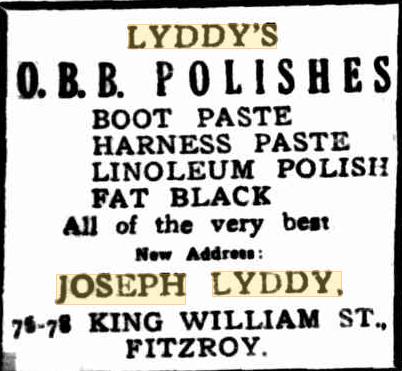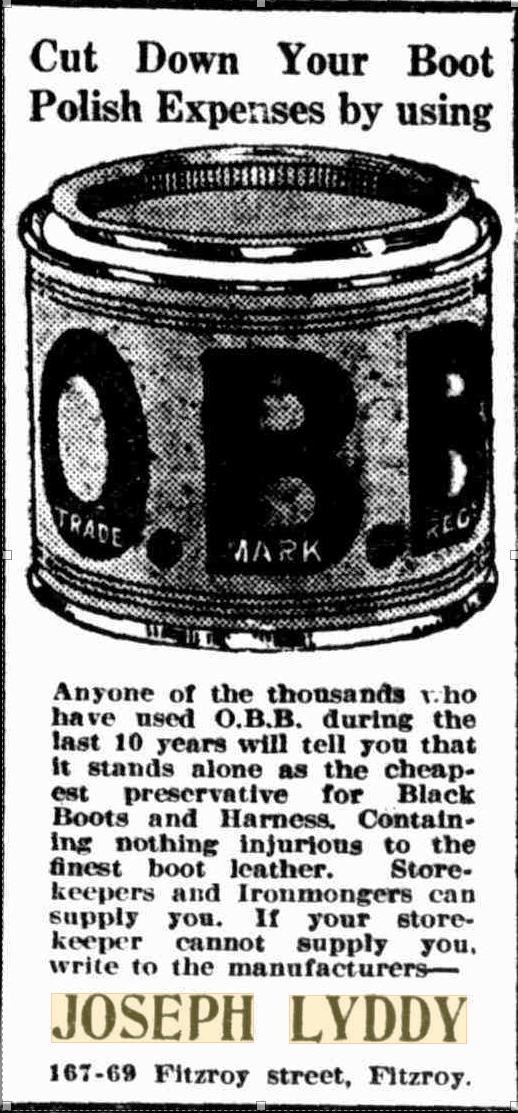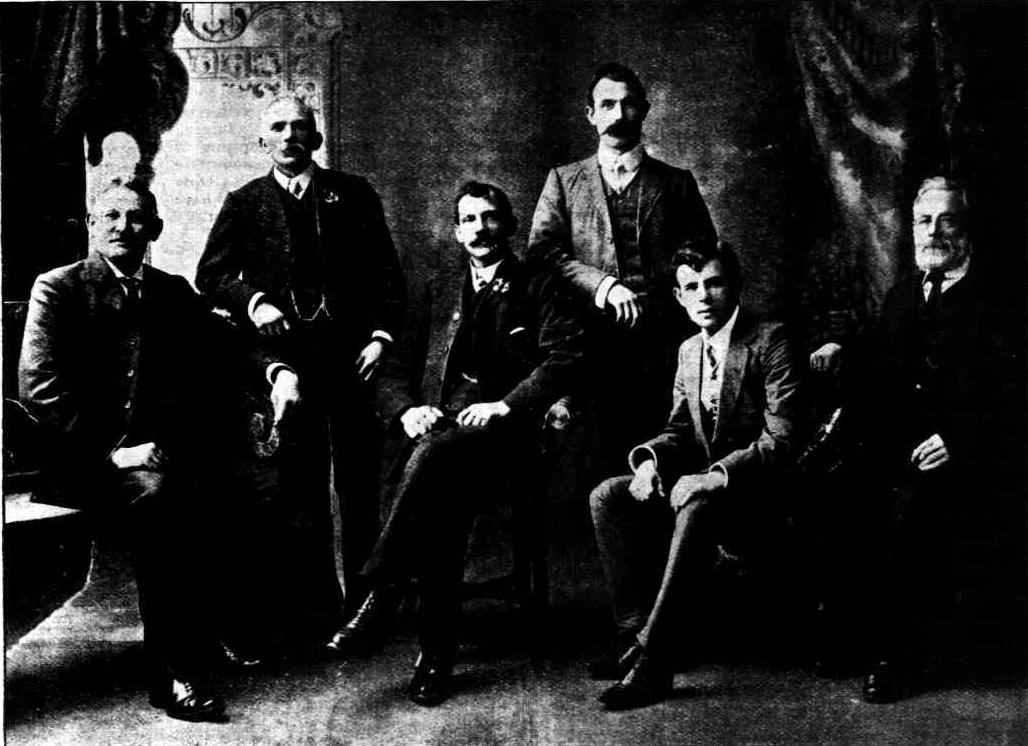THE BOOT TRADE IN SOUTH AUSTRALIA
TO THE EDITOR.
Sir—For some time past reports—some of a very incorrect nature—have appeared in your paper concerning the above trade, and up to the present we have deemed it advisable to allow these reports to pass unnoticed rather than trouble you with correspondence; and were it not for the extraordinary conduct of the boot operatives we would not now trouble you, but we think that in justice to both the public and ourselves that the facts pure and simple should be placed before them, Some time ago the boot manufacturers, with the exception of one house, formed an Association, and after having done so we wrote to the Operative Bootmakers' Union, informing them that we were given to understand that they had a- new statement of wages made out and in print, and if such were the case would they please forward a copy. We received a copy, and to our great surprise instead of taking the depressed state of the colony into consideration we found that they had actually made an increase in the proposed new wage-list. We expressed our opinion that their demands were unreasonable, and that in our opinion the wages paid in Victoria were, taking all things into consideration, the most suitable for this colony, and asked, as you will see from the accompanying correspondence, if they would select nine of their number to confer with us upon the subject. We received a communication from the Union stating that they had appointed nine of their number, and hoped that we would come to a settlement agreeable to all concerned. On our meeting you will readily understand that we were rather surprised to learn that the representative of the Operative Bootmakers' Union had no power to settle anything with us. The meeting was adjourned accordingly to see if those gentlemen would get the required power, but upon our again meeting we found that they were not empowered to settle anything with us, but could only confer on the new statement submitted by the Union, and whatever arrangements we might come to would have to be submitted to |a general meeting of the Bootmakers' Union for consideration. Finding, after a good deal of consideration, that we were not likely to come to any definite conclusion we wrote to the Union suggesting arbitration, with the result that the Union refused arbitration on any terms, as in any case it meant a reduction of wages, which they did not intend to submit to. On the 5th inst. we received a letter from the Operative Bootmakers' Union, accompanied with their proposed new list, slightly altered, informing us that on and after November 16 the same would be considered and acted upon as the statement of wages to be {aid, and also intimating that by that time all those men who were working at a weekly rate of wages would be required to give a week's notice, so is to be able to start work on the new system by the 16th. We, however, found that the Union had been treating separately with the house that did not belong to the Employers' Association, this particular house we are informed having some twenty six weekly hands with a number of boys employed, and we were also informed that this house would _be allowed to work another week with twenty-two weekly hands and their boys. We naturally expected that as that house would be allowed to work another week we would expect the same privilege until we were all put on an equal footing. Each employer accordingly informed the President of his establishment on Saturday morning that he expected his employes to work as usual for the present week, but to our great astonishment they informed us that they would work no longer than up to Monday evening, the 16th inst. We also wrote to the same effect to the President of the Bootmakers' Union. You will thoroughly understand that we have up to the present made no reduction in the wages we have been paying. We are there fore at a loss to understand what the men are going to stop work for. We now wish to give you for general information a few facts in answer to what has appeared in last Saturday's papers in giving a report of the proceedings of the Trades and Labour Council. 1. The boot operatives themselves say that they do not want and will not work weekly, and we say that we do not require them. 2. It is made to appear as though we had determined to reduce, wages from 25 to 30 per cent, from and after this day, November 16, whereas as a matter of fact we have offered no reduction^ as you will see by the correspondence, but simply expressed our opinion about the Melbourne statement and suggested arbitration. 3. It is stated that the men cannot earn more than 30s. per week. This may be near but not totally correct at the present time; but this is not owing to the rate of wages, but to the fact that the men are not fully employed, and that the public through scarcity of money and labour are obliged to buy the cheapest, or apparently cheapest, article they can get. The most of the commoner qualities of boots sold in Adelaide and a good number of those sold in the country are made up by the system of working men on weekly wages with the assistance of boys, or imported from Sydney and elsewhere. If the bootmakers as a body were willing to make the class of goods for the same wages as paid in the other colonies they would be fully employed instead of walking about idle. We feel sure that no 'one will think for a moment that if we could make these boots and pay expenses we would rather keep the men idle than make them. We will be most happy to supply a list of the wages as paid to our men who work full factory hours and during the time of year that we are able to keep them fully employed —and let it be understood that we do not refer to one or two, nor those who do any work at home, but the great majority of those who work regularly and during factory hours. It will be then seen that their earnings are nearer an average of 50s. than 30s. per week. It is stfid that rent is higher here than in Melbourne. This is not correct, for rent is cheaper here; and we feel sure it can be proved that rent has not been higher for some time, if ever, than in Victoria. Living can also be proved to be about the same. For general information we just wish to place before the public a sample of the wages as paid in Sydney, Melbourne, and Adelaide :— Slen's peg Ji.S., making and finishing— In Sydney, 1s. 9d.; Melbourne, from 2s. 4d. to 2s. lid.; Adelaide, 2s. Sd. to 3s. 4d„ and other lines in proportion. A great deal is tried to be made out of the fact that the boot trade is protected to the extent of 15 per cent. We will admit it, but we wish to point out that Victoria has a fixed duty and is enjoying prosperity, and the boot operatives are content to work for the statement which we consider is fair for Adelaide, and even this we only suggested should be taken as a groundwork for us to make a statement from. In regard to the extra 5 per cent, we wish to point out that the statement under which we are working our factories at present has been in existence from six to eight years, and without going hack to those good times at which the present wages were agreed to, we wish to point out that during the last three years the price of boots has fallen to such a figure that manufacturing is not remunerative. The result speaks for itself, viz., three have stopped manufacturing, in order to save themselves from ruin; two more have got time from their creditors, one of which admits that during the past three years he has lost £700 ; one has ,been sold off by his creditors ; and another, although with a Bank behind them, could not carry on. These are facts which all concerned know. We, as employers, are willing to make common cause with the men, and trust they will come to a reasonable settlement. You will see by our printed rules that we wish to avoid anything unpleasant, and are willing at all times to submit any disputes to arbitration, and so avoid, if possible, all chances Of stopping work, which is no profit to any one. Any further information we can give we will be most happy to do. We remain. Sir, &c.,
ALEX. DOWIE, President. JOSEPH LYDDY, STEPHEN PEARCE, Vice Presidents. H. SHERIDAN, Secretary, Boot Manufacturers' Association.
Office of the South Australian Boot Manufacturers' Association, Industrial Buildings, King William-street, Adelaide, September 17, 1885.
Mr. H. Barnett, Secretary to the Boot Operatives' Union.
Dear Sir—A meeting of the Association of boot manufacturers was held on the 15th inst, and after giving the most careful attention to your proposed statement of wages they came to the unanimous decision that the Victorian rate of wages was, all things considered, the best suited to our trade in South Australia; and they are of the opinion that there is nothing in the boot and shoe trade under present circumstances or in the immediate future prospects of the colony to warrant a higher rate of wages being paid than that which is paid in Victoria, and more especially as the trade for some years past has been unprofitable to those engaged in it. The employers beg to state that they wish to approach the employes in a reasonable, just, and amicable spirit, and they suggest that say nine of the employes be appointed to confer with an equal number of the employers to try and arrange this matter, and that the said employes be empowered to settle the scale of wages with the employers. We Rill expect a reply at your earliest convenience,—We have, &c.. A. DOWEE, President. JOSEPH LYDDY, STEFHEN PEABCE, J ) Vice-Presidents, H. SHERIDAN, Secretary. Labour League Hall, September 29, 1885.
Mr. H. Sheridan, Secretary the Boot Manufacturers' Association.
Dear Sir—In reply to yours of the 17th inst., asking the Bootmakers' Union to appoint nine of its members to meet an equal number of the employers in conference, I have the honour to inform you that at a meeting of the Union held on Monday evening last the following were elected delegates to represent the employes :—Messrs. Ralph. Tiegilgas. Hawker, Hoskins, Hill, Hetmeseey, Mccie, Shitevcs, tud Bircett. I have to request you to name time and place of meeting, and after this week we Shall be fully prepared to deal with and trust eventually to arrive at an amicable settlement of the whole question. I remain, &c,
H. BARNETT, Secretary S. A. Bootmakers' Union;
67, Hindley street, Adelaide, October 23,1885.
Mr. H. Barnett, Secretary Boot Operatives' Union.
Dear Sir—At an adjourned meeting of the representatives of the Boot Manufacturers' Association and the Boot Operatives' Union, held on Wednesday, the 14th inst, we failed to arrive at a satisfactory settlement of the wages question, and in consequence I am instructed by the Boot Manufacturers' Association to respectfully suggest to the Boot Operatives' Union the advisability of submitting the two wages lists, viz., the old Adelaide one and the Victorian list, before the committee of the Chamber of Manufactures, with a view of letting them decide which list shall be taken as a basis for our future guidance to draw up a wages list from, their decision to be final; or, if the Boot Operatives' Union would prefer it, to submit to a conference of say six employers of labour and an equal number of the Trades and Labour Council (the conference to choose their own Chairman) the two wages lists named above, and let them decide which shall be the basis to draw up a wages list from, their decision to be binding on all concerned. By giving your consideration at your earliest convenience to the wishes of the boot manufacturers herein contained, and replying as soon as possible, hoping it will be the means of fostering a closer feeling of friendship to all parties, I have, Sir, &c., H. SHERIDAN, Secretary Boot Manufacturers' Association. South Australian Bootmakers' Union. Adelaide, October 27, 1885.
Mr. H. Sheridan.
Dear Sir—Your communication of the 23rd inst. has been duly considered by the above Union. In reply I beg to say that the Union cannot see its way to accept either of your propositions, as in any case it would probably lead to a reduction on present rate of wages which we cannot at present submit to. I have also to inform you that the Union has appointed a committee to revise our new lists, which will I expect be ready for you within a week. It is to be hoped the alterations we shall make will be sufficient to meet the requirements of all parties concerned. I remain, &c , H. BARNETT, Secretary. Adelaide, November 5,1885. South Australian Bootmakers' Union.
Dear Sir—I am instructed by the above Union to inform you that the accompanying revised statement will be taken as the standard scale of wages by the Operative Bootmakers'. Union of South Australia on and after the 16th day of November last. I have also to acquaint you that in order to be strictly in accord with the general resolutions we have notified each employ^ under weekly wages to give one week s notice, so that his time may expire as nearly as possible to the above date. I have, &c., H. BARNETT, Secretary. 67, Hindley-street, Adelaide, November 14, 1885.
Mr. H. Barnett, Secretary Boot Operatives' Union.
Dear Sir—I am in receipt of yours of the 5th inst., and in reply I am instructed by the Boot Manufacturers' Association to inform you that the above Association learns with regret that you have had a conference with one firm in the trade respecting the statement of wages sent to the employers on the above date. And we further learn that the said firm were to be allowed another week for their weekly men to give notice. And as the number of these men are about equal to a moderately sized factory, we therefore consider, in justice to the other houses, that your action has been unfair, and that we therefore claim the right to keep all our men employed for another week at the old rates before giving you our final answer. Hoping you will consider the above, and reply as soon as possible, I have, &c., H. SHERIDAN, Secretary.
Conference with the Employers.
At 11 o'clock the delegates met at the Adelaide Boot Factory and conferred with the representatives of the employers, Messrs. A. Dowie, J. Lyddy, S. Pearce, H. Davis, P. A. O'Conner, F. Slade, W. Bermiugham, G. Blackebv, H. Sheiidan, J. Pinnick, and F. Jacobs (Secretary of Conference). The delegates of the operative bootmakers were introduced by Mr. Trenwith. Mr. A. DOWLE said he hoped there would be an end to the difficulty. Employers and men should study each other's interests. They were met to consider the conditions of employing the men, the rate of wages, and that of the men returning to work. The employers were willing to take back all who chose to go to work at the rate of wages they had been paid for the present. The meeting discussed the question of electing a Chairman for the whole Conference. Mr. STEWART stated that the men could not go back to work until they got the vote of the Union. The decision would be known that afternoon. Mr. [BATTLE proposed—"That the men return to work on Friday morning at the old rate of wages which the factories had been paying." Mr. STEWART seconded. Carried unanimously. Mr. TRENWITH suggested that the meeting should be a preliminary one. He thought it would be wise to have a Board of Conciliation but have no chairman outside, so that, a unanimous decision should be arrived at. He mentioned a case in Melbourne where the position of chairman was not always conducive to the unanimous settlement of a difficulty. A chairman had only a casting vote, and that could only be exercised when there was a deadlock. There was some conversational discussion as to the propriety of having a chairman. Mr. TRENWITH was proposed as chairman, and said it might be injudicious for him to act as he was a mediator, and if put in the chair he might be put in the position of a partisan. However, he would not refuse to act if both sides had full confidence in his impartiality. His duty was to report on the position of affairs, and he wished to bring about an amicable settlement of tbe differences between employers and employed, and would risk the consequences. Of course any chairman might be open to the charge of partiality. There were advantages and disadvantages in selecting a chairman- Who was not a local man ; in the first place he would have no prejudices, but on the other hand he would be deficient in local knowledge. Mr. T. Johnson was proposed as chairman: Mr. Trenwith was finally elected, after nearly an hour had been spent in discussing -the question of filling the chair. Mr. Jacobs was appointed Secretary to the Conference, and it was decided that it was desirable the Conference should sit from day to day until the bu&inesB was settled, and it was resolved to ask Messrs. D. & W. Murray's permission to meet in the Adelaide Boot Factory. The number of five on each side was fixed as the quorum, and the first meeting was settled for Friday at 10 a.m. Mr. STEWART moved—" That the question of employment of apprentices, the regulation of outdoor work, and employment of weekly men be decided first." He thought that with those points got over the rest of the business would be more speedily dispatched. Carried. The meeting then adjourned till next day at 10. Mr. Trenwith thanked the Conference for the confidence reposed in him. Conference with the Employers. (
1885, December 10).
Evening Journal(Adelaide, SA : 1869 - 1912), p. 2 (SECOND EDITION). Retrieved from
http://nla.gov.au/nla.news-article199140957
LYDDY.— On the 14th February, at her residence, 221, Gouger-street, Mary, relict of the late John Lyddy, beloved mother of Mrs. J. B. Siebert, Miss M. Lyddy, and John Lyddy, Adelaide, Joseph and Owen Lyddy, Melbourne, Mrs. P. McNamara, and Mrs. McDonald, N.S.W., aged 90 years. Arrived in ship Emerald Isle, 1854. Requiescat in pace. Family Notices (
1904, February 20).
Chronicle (Adelaide, SA : 1895 - 1954), p. 25. Retrieved from
http://nla.gov.au/nla.news-article87875961
AUSTRALIAN BOOT TRADE FEDERATION. ADELAIDE BRANCH EXECUTIVE.
The Operative Bootmakers' Union was formed in June, 1882, the officers elected being Messrs. O. Hatgrave (president), E. Tregilgas (vice-president), T. Hawker (treasurer), and G. Jarman (secretary). Abcut 100 members were enrolled at the first meeting. Several of those presents volunteered to act as organisers in the various factories, and in three months every member of the making; and finishing departments was enrolled, bringing up the total membership to just on 500 At first the employers were hostile to the union, and repeated but fruitless attempts were made to get them to meet in conference to draw up a scale of wages.
Left to right—Mr. W. P. Jackson (secretary); Mr. J. P. White (vice-president); Mr. W. Henley (president); Mr. J. D. Wiltshire (vice-president) : Mr. C. H. Rowe (minute secretary); Mr. G. Jarman (treasurer).
A committee was at last appointed by the union, which drew up a statement and submitted it to the employers, who decided not to entertain it. The members were called out on strike, which lasted for about seven weeks, being finally settled by the intervention of the Hon. W. Trenwith, of Victoria, who was at that time secretary of the Victorian Boot Operatives'Union. At the instance of Mr. Trenwith, the first Board of Conciliation was formed in connection with the trade. The first members of the board were Messrs. A. Dowie, H. Davis, J. Lyddy, P. A. O'Connor, and J. Bradley, representing the employers; and Messrs. W. Battle, £. Tregilgas, W P. Jackson, EL Barnett, and A. Dykes, the employees.
The board worked very well, and was considered by all concerned to be a great boon to trades unionism. For just on 11 years things worked very smoothly through the influence of -the board. Then came the introduction of improved machinery, which completely revolutionised the trade, with the result that the employers desired to adopt the system of weekly wages. The men contended that the machines could be worked on the piecework system, and after an anxious period spent in trying to bring about a settlement of the matter by means of the board, it was resolved that a ballot of the whole trade should be taken. It was decided by an almost unanimous vote that the conditions of the employers could not be accepted. Thuscommenced the strike of February, 1897, lasting for six months, at the end of which time the men were beaten and disorganised.
Then the employers, having the men under the whip, did practically as they liked. The few who still stuck together made up their minds to try and get the Factories Act amended in order to bring about a system of wages boards, on similar lines to the Victorian Act, which had just at that time been introduced by the Peacock Government and passed by Parliament. A meeting was called, but such was the apathy shown that from over 500 men in the trade only seven attended. However, a resolution was carried asking the Trades and Labor Council to appoint a deputation requesting the - late Right Hon. C. C. Kingston to introduce a wages board clause in the Factories Act. This he promised to do, thus beginning the wages board system in South Australia. It would not be out of place to give the names of the seven who attended that particular meeting:—G. Jarman, J. Minahan, A. A. Burford, T. Molloy, J. Conway, P. J. White, and W. P. Jackson.
For a time things went on as before, the men apparently not caring to try and help themselves, until the passing of the Amending Factories Act of 1900. Another attempt was then made to organise them. A meeting was called, at which a large number attended, and it was resolved to reorganise. Mr. P. J. White was elected president, Mr. W. P. Jackson vice-president, Mr. Geo. Jarmau treasurer, Mr. J. B. Gould secretary, and Mr. G. Gray minute secretary. By this time wages boards had been approved by Parliament, but, unfortunately, through an oversight of those in charge of the Bill, the regulations, which had also to be passed by both Houses, were overlooked. The Legislative Council —being weakened so far as Labor was concerned by the election of the Hon. C. C. Kingston and Messrs G. McGregor and R. S Guthrie to the Federal arena, and by the defeat of the Hon. A. A. Kirkpatrick—decided to suspend the regulations indefinitely, again disappointing the men. It was then decided to try and bring about the federation of the boot trade unions of the various States, and correspondence was opened up to try and accomplish the desired object.
A conference was held at Melbourne in April, 1902, which proved abortive through the New South Wales union not being prepared to join at that time. Another conference was held in April, 1904. A constitution was drawn up for submitting to the whole of the unions in the various States, which was finally adopted ; so at the present time a federated body exists, determined to exert every effort to limit the number of apprentices—a reform which is refused by the wages board. So far the wages board has fixed a minimum wage, and the employers are, as a rule, abiding fairly loyally to it. After the determinations came into force, the secretary reported that he had been discharged from his employment, and a special meeting was called, which decided that the time was ripe for the appointment of a permanent secretary to look after the interests of members. The present secretary (Mr. W. P. Jackson) was unanimously appointed to the position. Things are now going fairly well, and the union is on a solid basis. Unfortunately, trade is very dull at present, but it is to be hoped that it will improve shortly. AUSTRALIAN BOOT TRADE FEDERATION. —ADELAIDE BRANCH EXECUTIVE. (1908, June 27). Herald (Adelaide, SA : 1899 - 1910), p. 5. Retrieved from http://nla.gov.au/nla.news-article110186332
OBITUARY
The Late Mrs. Elizabeth Siebert.
Another link with the old days has been severed by the death of a lady, who was the embodiment of heroic principles rightly associated with the pioneer Catholics of Sth. Australia, and who was notorious for her kindness, generosity, and constancy. On the 22nd inst. Mrs. Elizabeth Siebert, Wakefield Street, passed to her eternal reward in her 97th year.
It is a coincidence that the late Mrs. Siebert was born in the year in which the Holy Sacrifice of the Mass was first offered in South Australia. Ennis, Co. Clare, Ireland, was her birthplace, and there she lived as a child with her parents, John and Mary Lyddy, during the awful years of the great famine. In 1854 the parents decided to emigrate to Adelaide, and with four sisters and three brothers, the late Mrs. Siebert arrived at Port Adelaide in the ship "Emerald Isle."
In 1873 Elizabeth Lyddy married Joseph Bartholomew Siebert in St. Francis Xavier's Cathedral, Wakefield Street. The marriage was solemnised by Archbishop Reynolds—at that time Father Reynolds. The couple lived their married life in Adelaide, in the West End, and, later, in Coghlin Place, where Mr. Siebert conducted the business of builder and under-taker. He died in 1892, and of the family of three sons and one daughter, one son, Frank J. Siebert, of Adelaide, survived the late Mrs. Siebert. Mary died in infancy and Vincent and Peter predeceased her by some years.
Miss Mary Lyddy, of West Terrace, Adelaide, is a sister of the late Mrs. Siebert.
The funeral took place at the Catholic Cemetery, West Terrace. Rev. Fr. C. Thompson, Adm., officiated at the graveside, assisted by Rev. Frs. E. Griffiths, M. Comey, and T. Moore. OBITUARY (
1936, August 28).
Southern Cross (Adelaide, SA : 1889 - 1954), p. 10. Retrieved from
http://nla.gov.au/nla.news-article167080054
OBITUARY
MR. JOHN LIDDY
The death of Mr. John Liddy at Wallaroo Hospital on February 12 came not only as a deep sorrow to his family but was the cause of widespread and genuine regret to the wide circle of his friends. Mr. Liddy, who had enjoyed fairly good health, was taken seriously ill on February 3. An operation for
appendicitis was performed at the hospital. The operation was successful, and for a time the state of the patient satisfied the doctors. On the ninth day, however, his heart failed under the strain, and he passed peacefully away, fortified by all the rites of the Church, of which he was a staunch and earnest member.
Mr. John Liddy's parents came from Ireland in the 50's, and settled in the Kapunda district. They moved after a few years to Wallaroo Bay, where, 68 years ago, Mr. Liddy was born. He was the fifth child baptised by the late Archbishop Reynolds at Wallaroo, His Grace being appointed to the charge of the Kadina and Wallaroo districts in succession to Father Pall herber, S.J., of Sevenhill, in June, 1865.
Mr. Liddy was one of the first pupils of the Sisters of St. Joseph at Wallaroo. His kindly feeling towards the Sisters dated from his school days, and he frequently and in many ways unknown to the general public helped to make the lot of his old teachers, and those who came after them, easier.
Leaving school at the age of ten, he worked at the Smelters in different capacities, until about thirty years ago, when he entered the hotel business, at which he was very successful, not only in Wallaroo but at Kadina, Paskeville, Mallala, and Port Pirie as well.
Mr. Liddy married Miss Gertrude Costello, who died fifteen years ago, and, as his second wife, Miss Cecilia O'Neill, who survives him. He leaves a family of six sons, and three daugh ters—Messrs. A. H. (Snowtown), Ed ward, Donald, Ronald (Wallaroo), John and Wilfred (Paskeville); Mrs. R. Neilson (Goodwood), Misses Katherine (Adelaide) and Sylvia-(Wallaroo). Mr. M. Liddy, of Kadina, is a brother, and Mesdames H. Brady (Lockiel) and P. O'Loughlin (Bute) sisters. OBITUARY (1934, March 2). Southern Cross (Adelaide, SA : 1889 - 1954), p. 10. Retrieved from http://nla.gov.au/nla.news-article168913472
LYDDY.—On the 14th September at her residence. 233 Faraday-street, Carlton, Mary Anne, beloved wife of Joseph Lyddy, and loving sister of Thomas, Eugene, John, Sylvester, and Cecilia Sullivan. On whose soul. Sweet Jesus, have mercy. Advertising (
1921, September 22).
Advocate (Melbourne, Vic. : 1868 - 1954), p. 21. Retrieved from
http://nla.gov.au/nla.news-article171241355
The children of deserving poor have lost a true friend in Mrs. Joseph Lyddy, of Faraday-street, Carlton, who passed away on the 14th inst., having been in ill-health for some time. Up to the last Mrs. Lyddy performed one of her main acts of charity—namely, the making of garments for the orphaned and friendless. The deceased lady had a particular affection for little children, and devoted all" her spare time, throughout the years of a long and useful life, to advancing the welfare of such as needed kindly, practical services of every kind.
A sad fatality last week robbed Australia of one of her foremost women painters, Miss Bertha Merfield, who, winning some years ago the Longstaff travelling scholarship, went to Europe to perfect her art, journeying even through Finland in search of the novel in landscape and character. Miss Merfield's first laurels were gained in Stawell, from the art school of which well-known mining township she gradually gravitated towards the best art centres of Melbourne. An inherent love of nature, as represented in the Australian bush, served to give her brush almost a magic touch when wild flowers and shrubs and towering trees were pictured upon the canvas; and in pastel painting she had few, if any, equals out here. At carving leaf and flower and bole of trees Miss Bertha Merfield was equally clever, and specimens of fine work in this connection are to be found in many a mansion abroad as well as in her native land. One of the last pieces of work accomplished by the clever artist's fingers was the pastel painting of Australian wild flowers, etc., which adorns the New Theatre, corner Glenferrie and Dandenong roads, Malvern. Daintiness to art of faery, combined with faultless accuracy of detail and smoothness of finish, characterises the pastel and other delicate specimens of the late Australian woman-painter's works. And her skill did not end there, but was made vividly evident in portraiture in oils, one of her figure paintings, a dark-eyed girl in Eastern robe, having been given a place of honour on the walls of a noted art gallery. Miss Merfield's successes abroad never tempted her to hold less dear the Australian scenes and friends, for whom she never ceased to cherish a fervent and faithful affection. The Ladies Letter (
1921, September 29).
Advocate (Melbourne, Vic. : 1868 - 1954), p. 32. Retrieved from
http://nla.gov.au/nla.news-article171241705
BEREAVEMENT CARDS.
MR. JOSEPH LYDDY wishes, to THANK one and all of his many dear Friends for cards, telegrams, floral tributes, and expressions of sympathy during his recent sad bereavement in the loss of his devoted Wife; especially Father Macnama and Dr. Oder. Will all kind friends accept this intimation of his deepest gratitude. 233 Faraday street, Carlton. Family Notices (1921, September 28). The Register (Adelaide, SA : 1901 - 1929), p. 6. Retrieved from http://nla.gov.au/nla.news-article63425927
CHARLTON.—In loving memory of my dear brother, Jim, who was killed in the Battle of the Somme. 1916. —P. M. Lyddy. Family Notices (
1924, November 5).
The Advertiser (Adelaide, SA : 1889 - 1931), p. 8. Retrieved from
http://nla.gov.au/nla.news-article43247903
LYDDY. — On the 5th July, at his residence, Faraday street, Carlton, Victoria, Joseph Francis Lyddy, youngest son of the late John and Mary Lyddy, of Adelaide, and beloved brother of Mrs. J. B. Siebert and Miss M. Lyddy, of Gouger street, and Mrs. Annie McDonald, of Enmore, NSW. Requiescat in pace. Family Notices (
1925, July 9).
The Register (Adelaide, SA : 1901 - 1929), p. 8. Retrieved from
http://nla.gov.au/nla.news-article57302089
WOOL GREASE FOR DUBBIN
Dubbin, with which all boots Issued to Britain's Home Guard are In future to be treated, has for one of its main ingredients grease salvaged from the wool of sheep. Today the demand for dubbin it! phenomenal in' Britain because it not! only soften* leather and keeps boots' waterproof, but is a protective against gas. From one London factory alone tons of dubbin is' being turned out not only for the Home Guard, but for the Army, the Royal Air Force, and the women of the A.T.S. A single contract runs to 250,000 two-ounce tins; but It also goes off In 36lb drums into which it is poured from huge vats. From the same factory great quantities of boot polish, which they produced to the tune of 2,000 tons a year In peace time, are now going to the Canadian Army and to the forces of the United States. WOOL GREASE FOR DUBBIN (
1942, August 28).
Western Grazier (Wilcannia, NSW : 1896 - 1951), p. 2. Retrieved from
http://nla.gov.au/nla.news-article139556276
TO MAKE DUBBIN.
1. 2oz. yellow soap, 2oz. Venice turpentine, half a pint drying oil, half a pint eastor oil. Molt the wdx and turpentine with the oils over a slow fire. Rub well into the dry leather of the boots at a short distance from the fire, and repeat the rubbing, if required, till the leather is saturated. 2. Shellac loz., tallow 3oz., litharge 4oz., methylated spirit 7oz., lampblack, 20oz., yellow wax 30oz., linseed oil 40os., treacle 40oz., turpentine 56oz. Boil the litharge and linseed together for one hour. Add the wax and tallow, and then. the c treale, heating to drive of the water; r then thoroughly. incorporate the lamp- black, and finally the turpentine. When quite cold add the shellac dissolved in a the spirit. 3. Take tallow lib., beeswax -lb., castor or. neatsfoot oil half a pint, lampblack loz. Mix by heat. Proof against snow or water. 4. Take one gill of linseed oil, 2oz. of beeswax, 8ozs. of Burgundy pitch, 2 os. of turpentine. Mix the above, and dissolve in a slow oven. It is ready when cold. 5. Take a pint of boiled linseed oil, 1lb. of mutton suet, 6oz. of clean beeswax, and 4ozs. of resin. Melt these ingredients over a fire, and mix them thoroughly together. When warm, but not hot enough to shrink the leather, lay on plentifully with a brush, taking care that the boot or shoe is quite dry and clean. TO MAKE DUBBIN. (
1920, February 13).
Queanbeyan Age and Queanbeyan Observer(NSW : 1915 - 1927), p. 3. Retrieved from
http://nla.gov.au/nla.news-article31652621 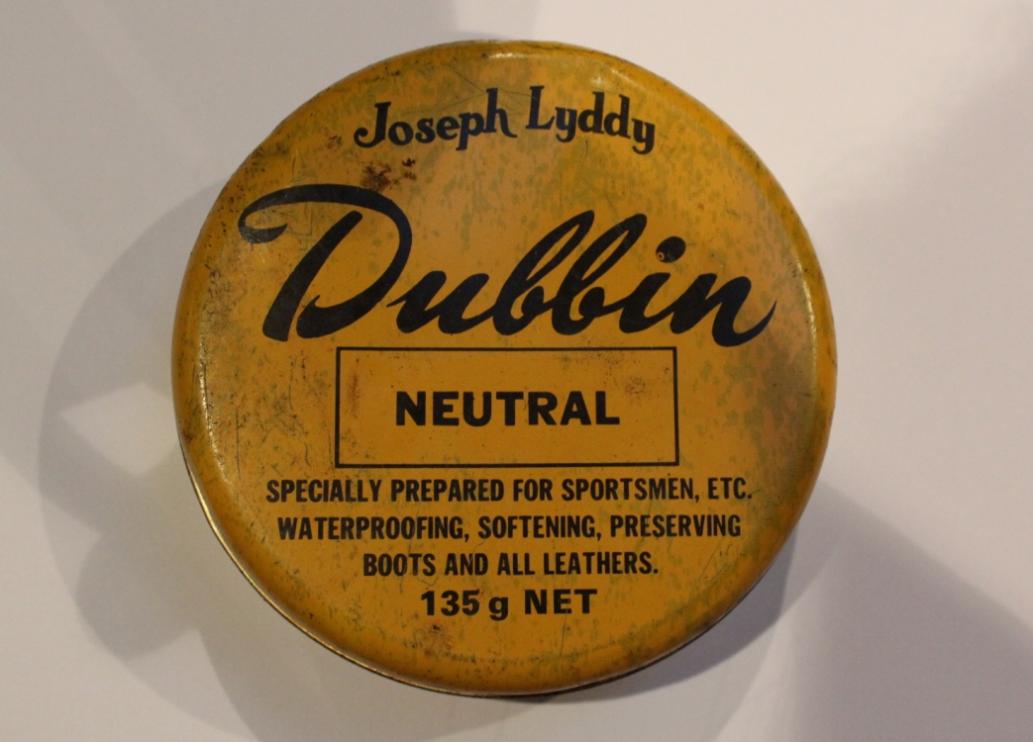
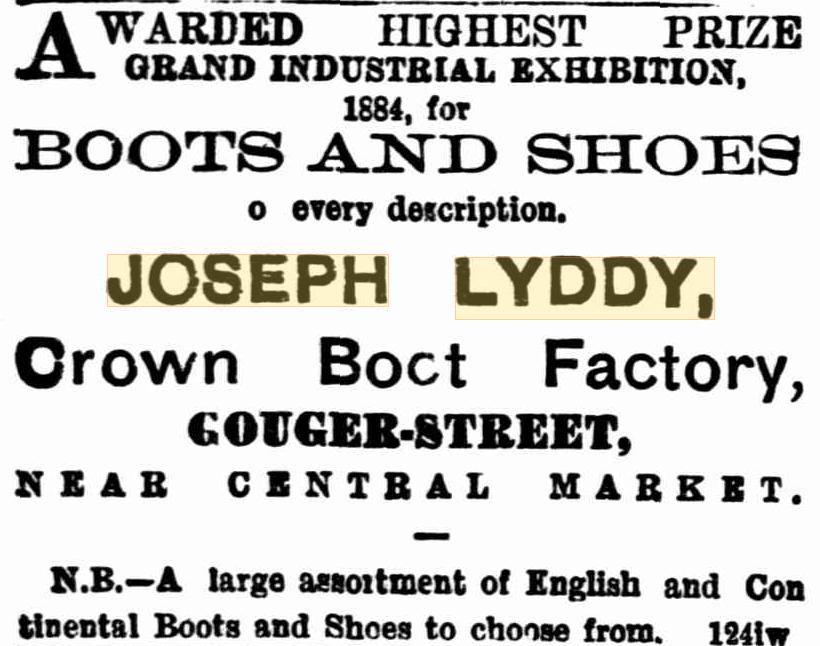
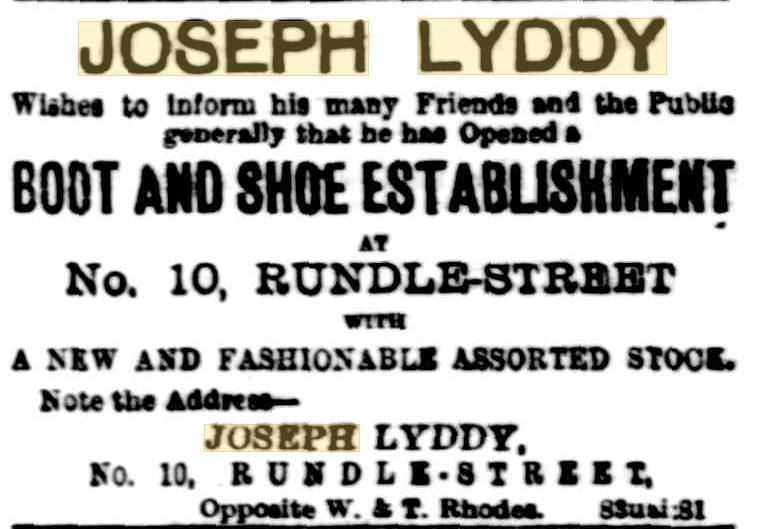
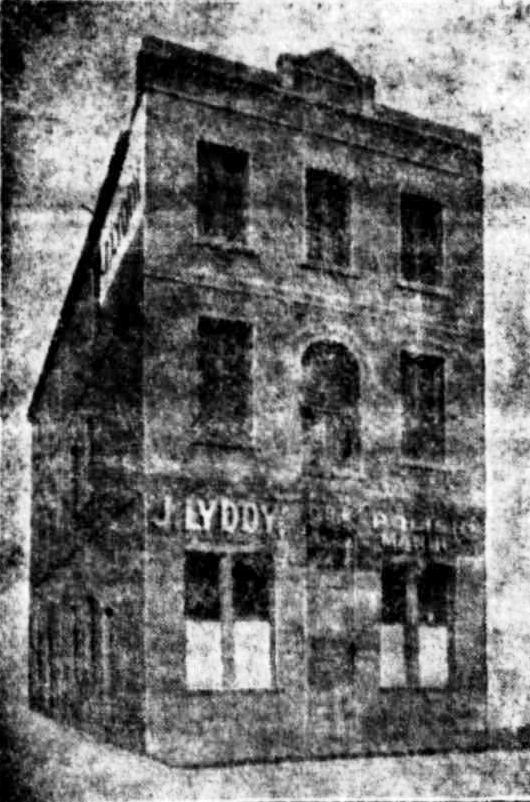 GENERAL NEWS
GENERAL NEWS